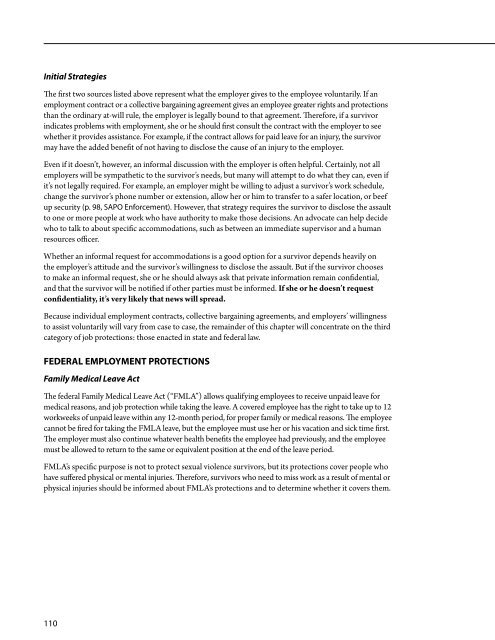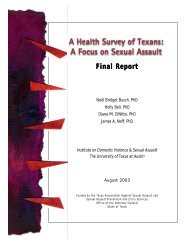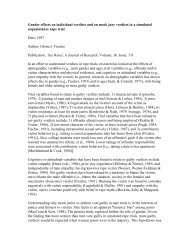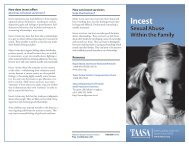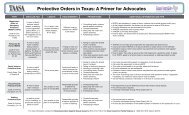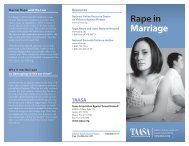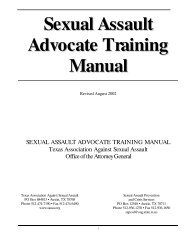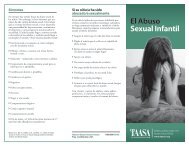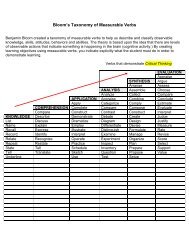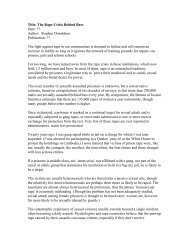Sexual aSSault LEGAL ADVOCACY MANUAL - Texas Association ...
Sexual aSSault LEGAL ADVOCACY MANUAL - Texas Association ...
Sexual aSSault LEGAL ADVOCACY MANUAL - Texas Association ...
Create successful ePaper yourself
Turn your PDF publications into a flip-book with our unique Google optimized e-Paper software.
Initial Strategies<br />
The first two sources listed above represent what the employer gives to the employee voluntarily. If an<br />
employment contract or a collective bargaining agreement gives an employee greater rights and protections<br />
than the ordinary at-will rule, the employer is legally bound to that agreement. Therefore, if a survivor<br />
indicates problems with employment, she or he should first consult the contract with the employer to see<br />
whether it provides assistance. For example, if the contract allows for paid leave for an injury, the survivor<br />
may have the added benefit of not having to disclose the cause of an injury to the employer.<br />
Even if it doesn’t, however, an informal discussion with the employer is often helpful. Certainly, not all<br />
employers will be sympathetic to the survivor’s needs, but many will attempt to do what they can, even if<br />
it’s not legally required. For example, an employer might be willing to adjust a survivor’s work schedule,<br />
change the survivor’s phone number or extension, allow her or him to transfer to a safer location, or beef<br />
up security (p. 98, SAPO Enforcement). However, that strategy requires the survivor to disclose the assault<br />
to one or more people at work who have authority to make those decisions. An advocate can help decide<br />
who to talk to about specific accommodations, such as between an immediate supervisor and a human<br />
resources officer.<br />
Whether an informal request for accommodations is a good option for a survivor depends heavily on<br />
the employer’s attitude and the survivor’s willingness to disclose the assault. But if the survivor chooses<br />
to make an informal request, she or he should always ask that private information remain confidential,<br />
and that the survivor will be notified if other parties must be informed. If she or he doesn’t request<br />
confidentiality, it’s very likely that news will spread.<br />
Because individual employment contracts, collective bargaining agreements, and employers’ willingness<br />
to assist voluntarily will vary from case to case, the remainder of this chapter will concentrate on the third<br />
category of job protections: those enacted in state and federal law.<br />
Federal Employment Protections<br />
Family Medical Leave Act<br />
The federal Family Medical Leave Act (“FMLA”) allows qualifying employees to receive unpaid leave for<br />
medical reasons, and job protection while taking the leave. A covered employee has the right to take up to 12<br />
workweeks of unpaid leave within any 12-month period, for proper family or medical reasons. The employee<br />
cannot be fired for taking the FMLA leave, but the employee must use her or his vacation and sick time first.<br />
The employer must also continue whatever health benefits the employee had previously, and the employee<br />
must be allowed to return to the same or equivalent position at the end of the leave period.<br />
FMLA’s specific purpose is not to protect sexual violence survivors, but its protections cover people who<br />
have suffered physical or mental injuries. Therefore, survivors who need to miss work as a result of mental or<br />
physical injuries should be informed about FMLA’s protections and to determine whether it covers them.<br />
110


